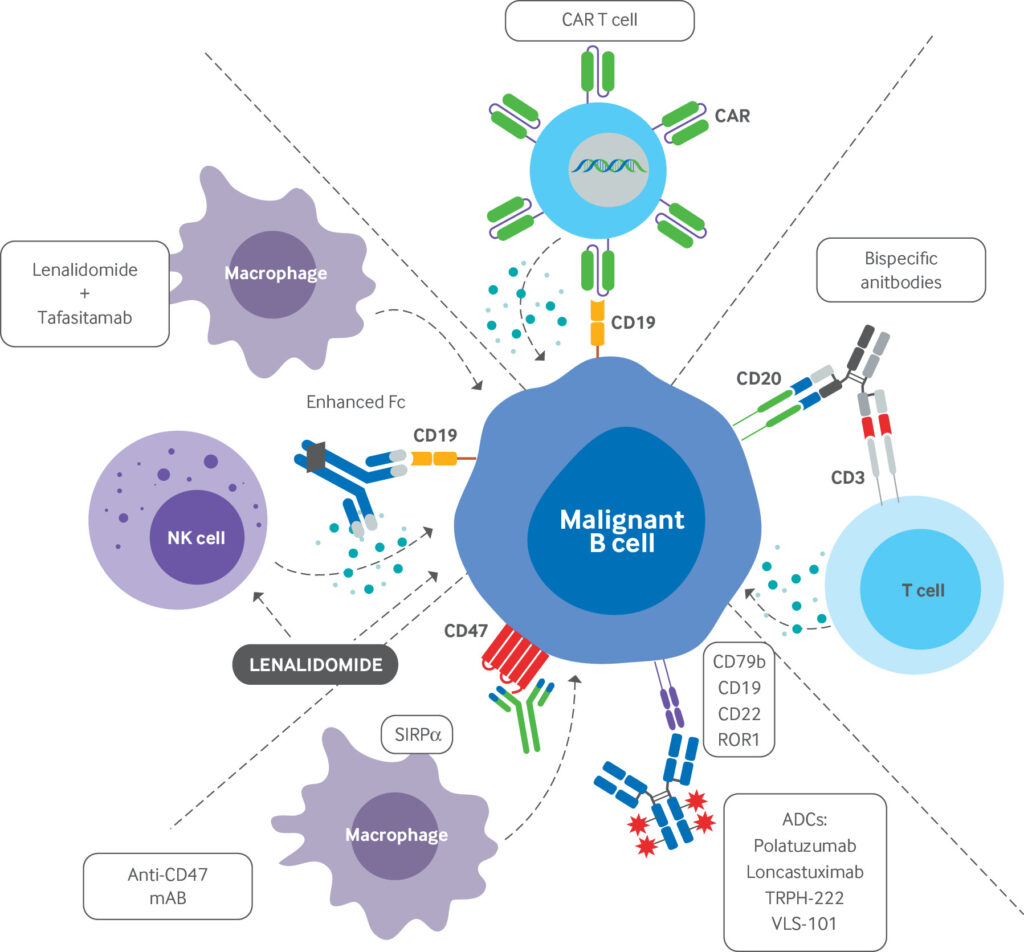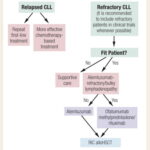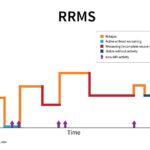Follicular B-cell non-Hodgkin lymphoma (NHL) is a slow-growing form of lymphoma that primarily affects B lymphocytes, the immune cells responsible for producing antibodies. It is characterized by the abnormal growth of these cells in the lymphatic system, typically presenting as enlarged lymph nodes. While the disease is often manageable with initial treatments, a subset of patients experience relapse after achieving remission. Relapsed follicular B-cell non-Hodgkin lymphoma presents a significant challenge in oncology due to its persistent nature and the complexity of finding effective treatments.
In this comprehensive guide, we delve into the causes, symptoms, treatment options, and prognosis of relapsed follicular B-cell non-Hodgkin lymphoma, offering insights into modern therapies and management strategies for those affected by this condition.

What Is Relapsed Follicular B-Cell Non-Hodgkin Lymphoma?
Definition and Characteristics
Relapsed follicular B-cell non-Hodgkin lymphoma refers to the recurrence of the disease after a period of remission following initial therapy. Follicular lymphoma (FL) is classified as a low-grade (indolent) NHL, meaning it progresses slowly. However, some patients may experience a relapse even after a seemingly successful treatment. This recurrence can happen months or years after the initial diagnosis, requiring a reevaluation of treatment strategies.
Differences Between Relapsed and Refractory Follicular Lymphoma
It is crucial to distinguish between “relapsed” and “refractory” follicular lymphoma. While relapsed lymphoma refers to the return of the disease after a period of remission, refractory lymphoma is a term used to describe cases where the disease does not respond to initial treatment. Both conditions are associated with poor outcomes and require specialized therapeutic approaches.
Risk Factors for Relapsed Follicular B-Cell Non-Hodgkin Lymphoma
Genetic Mutations and Molecular Drivers
Relapsed follicular lymphoma often occurs due to changes at the molecular and genetic levels. Certain mutations in the BCL-2 gene, which inhibits apoptosis (programmed cell death), are frequently observed in follicular lymphoma. These mutations help the cancerous B-cells evade death, leading to their accumulation and eventual relapse. Other mutations, such as those involving TP53, which is involved in regulating the cell cycle, can also contribute to disease progression and relapse.
Minimal Residual Disease (MRD)
Minimal residual disease (MRD) is another significant factor in relapsed follicular lymphoma. Even after successful initial treatment, small numbers of lymphoma cells may remain undetected in the body. Over time, these residual cells can proliferate and cause the disease to return. Detecting MRD using advanced molecular techniques can help predict relapse and guide therapeutic decisions.
Previous Treatment and Response
The likelihood of relapse is also influenced by the type of treatment initially used. For example, patients who receive chemotherapy without additional immunotherapy or targeted therapy may have a higher risk of relapse. Additionally, the stage of lymphoma at the time of initial diagnosis can influence relapse rates. Patients with advanced-stage disease are more likely to experience a recurrence than those with early-stage lymphoma.
Symptoms of Relapsed Follicular B-Cell Non-Hodgkin Lymphoma
Common Symptoms
When follicular lymphoma relapses, the symptoms are often similar to those experienced during the initial diagnosis, but they may be more severe or frequent. Common symptoms include:
- Swollen lymph nodes: Persistent or newly enlarged lymph nodes in areas such as the neck, armpits, or groin.
- Fatigue: A feeling of constant tiredness or weakness, even after rest.
- Unexplained weight loss: Significant weight loss without any intentional changes in diet or physical activity.
- Night sweats: Profuse sweating during sleep, often accompanied by fever.
- Fever: Low-grade fever without an apparent infection.
- Itching: Persistent itching that is not related to any skin condition.
- Pain: Discomfort or pain in the lymph nodes, abdomen, or chest, depending on the areas affected by lymphoma.
Patients may also experience frequent infections due to the compromised immune system, as well as bruising or prolonged bleeding due to decreased platelet counts.
Treatment Options for Relapsed Follicular B-Cell Non-Hodgkin Lymphoma
Immunotherapy and Targeted Therapy
Relapsed follicular B-cell non-Hodgkin lymphoma often requires a shift to more aggressive or specialized treatments. Immunotherapy and targeted therapy have shown significant promise in treating relapsed cases by targeting specific molecular pathways involved in lymphoma cell survival.
Monoclonal Antibodies
Monoclonal antibodies like Rituximab are commonly used in the treatment of follicular lymphoma. Rituximab targets the CD20 protein on the surface of B-cells, including cancerous B-cells, marking them for destruction by the immune system. When used in combination with chemotherapy or as a standalone treatment, monoclonal antibodies can significantly reduce the risk of relapse.
Targeted Agents
Targeted therapies focus on inhibiting the molecular signals that drive lymphoma cell growth. For example:
- BCL-2 Inhibitors: Venetoclax, a BCL-2 inhibitor, helps promote the death of cancerous B-cells by blocking the protein that prevents cell apoptosis.
- PI3K Inhibitors: Drugs such as Idelalisib target the PI3K signaling pathway, which is involved in B-cell survival, making them effective in relapsed cases.
These therapies are often used in combination with other treatments to enhance their effectiveness and reduce the likelihood of relapse.
Chemotherapy
Chemotherapy remains a cornerstone of treatment for relapsed follicular lymphoma, although its role is more limited compared to targeted and immunotherapies. The most commonly used chemotherapy regimens include CHOP (Cyclophosphamide, Doxorubicin, Vincristine, Prednisone) and FCR (Fludarabine, Cyclophosphamide, Rituximab). These regimens are effective but are typically reserved for patients with aggressive relapses or when other therapies fail.
Stem Cell Transplantation
For high-risk patients with relapsed follicular lymphoma, stem cell transplantation may be an option. Autologous stem cell transplantation, in which the patient’s own stem cells are used, offers the possibility of long-term remission. However, this procedure is associated with significant risks, including infection and graft-versus-host disease.
Clinical Trials
Patients with relapsed follicular lymphoma may also be eligible for clinical trials investigating novel therapies. These may include newer agents, such as CAR T-cell therapy, which involves modifying the patient’s T-cells to target and attack lymphoma cells. Clinical trials provide access to cutting-edge treatments that may not yet be available through conventional pathways.
Prognosis for Relapsed Follicular B-Cell Non-Hodgkin Lymphoma
The prognosis for patients with relapsed follicular lymphoma depends on various factors, including the patient’s age, general health, and the genetic characteristics of the lymphoma. The indolent nature of follicular lymphoma means that many patients can live for several years after a relapse, particularly with access to modern therapies. However, relapsed cases that do not respond to treatment have a poorer prognosis.
Factors Affecting Prognosis:
- Genetic markers: The presence of certain mutations, such as TP53 deletion, can make relapsed follicular lymphoma more difficult to treat.
- Treatment response: Patients who respond well to first-line therapies tend to have better long-term outcomes.
- Overall health: Younger, healthier patients generally have better survival rates.
Recent advances in immunotherapy and targeted therapies have significantly improved the outlook for patients with relapsed follicular lymphoma, but ongoing research continues to explore ways to enhance survival rates.
Relapsed follicular B-cell non-Hodgkin lymphoma remains a challenging condition for both patients and clinicians, requiring a tailored approach to treatment. The emergence of immunotherapy, targeted therapies, and stem cell transplantation offers new hope for those with recurrent disease, improving the overall prognosis for many patients. With ongoing research into novel treatments, the future for those affected by relapsed follicular lymphoma looks increasingly promising. By understanding the molecular drivers of relapse and leveraging the latest advancements in therapy, it is possible to achieve better management and outcomes for patients with this complex and persistent form of cancer.

